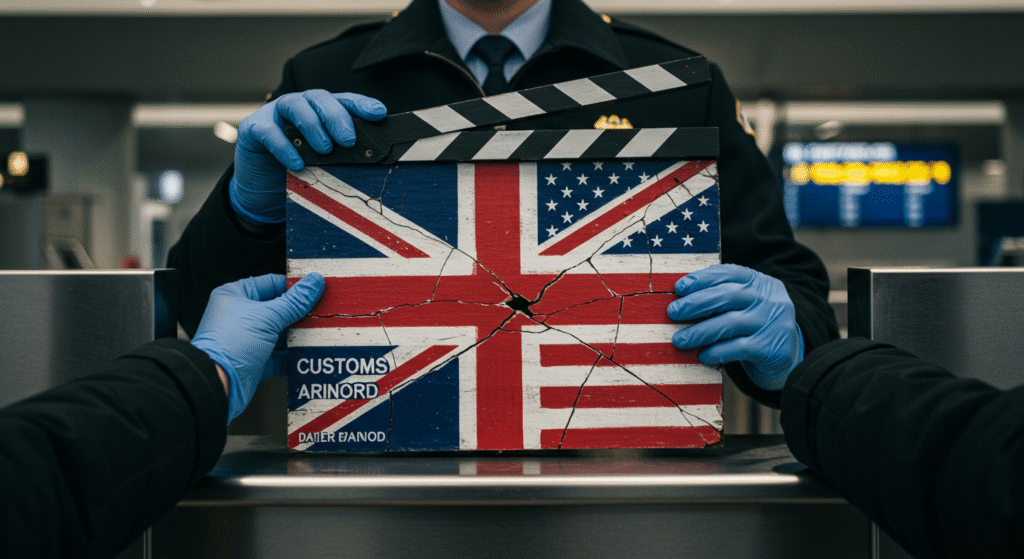Urgent Alert: How Trump’s Tariffs Jeopardize Hollywood.
Claudine
Cultural Exchange through UK-US co-productions, and US film studios, do utilize distinctive stories, cultural visions, and filmmaking aesthetics, which sustain American filmmaking. Tariffs could end this exchange. And potentially wipe out US Diversity, Equity and Inclusion (DEI) audio-visual industrial output.
British films tend to experiment with genres and topics unlike those of more conventional Hollywood films. They might include refined dramas, comedies, and social commentaries that appeal to global audiences. Tariffs will undermine, perhaps even eradicate these co-production benefits. There are numerous other ways in which Trump’s tariffs could damage US Film industry, as follows:
- Market Expansion: Partnerships with UK filmmakers allow US companies to penetrate global markets more successfully and expand further by leveraging the established UK distribution channels, to market films throughout Europe and beyond. These opportunities will be reduced or discontinued especially for DEI films.
- Audience Appeal: American distributors usually take advantage of the British film’s popularity to draw audiences familiar with British culture and narratives, which potentially enhances box office revenues. This will end for low budget productions.
- Co-production distributes production costs and risk among parties, so that US companies can usually afford potentially profitable ventures without absorbing all the costs. Loss of this resource will most certainly adversely affect US DEI productions.
- Tax Incentives: The UK has several schemes of tax relief for film production, making co-productions appealing on a financial basis for US studios aiming at optimizing budgets. Tariffs will reduced access will adversely affect production of DEI films.
- Talent Pool and Collaboration: Co-production with the UK facilitates U.S. film and television companies’ ability to work with a qualified body of actors, writers, directors, and crew, several of whom are critically acclaimed in their respective categories. New DEI talent could be excluded to make way for established talents.
- Innovative Partnerships: Collaborations are an opportunity for creative approaches and innovative methods of telling stories, which are mutually advantageous for U.S. and UK partners. DEI access will be squeezed out.
- Enhancing Industrial Connections: Building relationships with UK filmmakers and production units builds stronger networks and collaboration, increasing U.S. studio international presence. This will not encourage greater, if any DEI input.
- Co-Production Treaties: The U.S. and UK share treaties that enable co-productions, simplify funding and minimize legal hurdles, making co-operation on co-productions more straightforward for companies. There is already limited DEI access in this framework as there are few successful small production companies. The likelihood that this will improve, or change take up, is very slim.
- Prestige and Credibility: Producing films that receive critical praise or are recognized at major film festivals helps build reputation for US Studios by demonstrating a focus on quality and global narratives. Progress by DEI productions, will likely come to a halt.
- Award potential: UK films tend to do well at international awards, and association with such productions will increase the global exposure of US studios. Few DEI productions ever make this list. Tariff means even fewer or none will.
- Investment made by American studios into medium and low-budget films helps them diversify beyond the risky blockbusters, distributing their investment over different films that can generate decent returns with lower investment. There will now be more reliance on risqué blockbusters to make it. Big pressure!
- By creating and distributing a range of films, US studios can appeal to multiple audiences, which strengthens total marketplace flexibility. Tariff means not anymore.
The imposition of US tariffs on UK, implies that net benefits flow only one way—from USA to UK film industry. In fact, it’s a two-way flow. To be totally honest, USA is the bigger net beneficiary of this co-pro relationship. Not only does such collaboration allow for creative expression and cross-cultural exchange, but it also provides for increased market standing and fiscal sustainability for American-based studios within a global industry, that is becoming increasingly more competitive. Tariffs will turn the clock back, by wiping out this progress.
HOW TARIFF WILL AFFECT THE UK FILM INDUSTRY
Many film makers think that UK film industry sold its soul, (authenticity, independence and viability), to Hollywood a long time ago. This means that UK film industry, has been a by-product of Hollywood, with no real identify of its own, for the last 50-60 years. Yet US tariff on UK film industry could absorb, or destroy (same difference) the little that’s left of UK industry, in much worse ways as follows:
- Tariffs are hardly likely to bother big budget franchises, such as: James Bond franchise, Mission Impossible, Harry Potter films, and the various superhero movies. But they raise serious questions about sources of alternative production resources for medium-sized and low budget movies, which provide ‘entry’ into the industry for young film making talents, particularly women, Black and global majorities etc.
- The popularity of US films often shapes consumer tastes and expectations in the UK, leading to a preference for blockbuster productions associated with Hollywood franchises. Tariffs will result in fewer low budget films being made; perhaps with lower production values; and may price these less competitive productions out of mainstream access. In other words, consumers may only be able to view these films at remote, less comfy venues, at unsociable hours, and for extortionate fares, over a shorter timeframe.
- UK film studios benefit from investment from Hollywood studios, and production companies looking to shoot films in the UK, due to favourable tax incentives and high-quality production facilities. This source of revenue could dry up; or be reduced, with devastating implications for employment.
- Many American studios utilize UK-based post-production services, benefiting from the high-quality expertise available in the UK, which can influence workflow and practices in the UK film sector. This source of revenue, growth and development will be adversely affected.
- Many UK films rely on US distribution networks for wider international reach. Success in the US market can significantly enhance the visibility and profitability of a UK film. However, tariffs will make distributing niche films unprofitable; subsequently debasing this service and reducing or eradicating the revenue it generates.
- Many prestigious film awards, such as the Oscars, highlight films, often impacting which films gain attention and funding in the UK. Success in the US can lead to increased interest and prestige for UK films. Tariffs will exclude low and medium budget films.
- The growth of streaming services like Netflix, Amazon Prime Video, and Disney+ has changed the landscape of film production and distribution. These platforms have invested heavily in UK content and often feature films that appeal to both UK and US audiences, thus reshaping industry dynamics. However, tariffs could end opportunities, and reverse these dynamics, to status quo ante, which is not good.
- Streaming services also allow UK films to find audiences globally, leveraging Hollywood’s marketing strategies to reach wider audiences. Tariffs will make this costlier for the client, resulting in reduced access, revenue, and opportunities for low budget (DEI) film makers.
ELEPHANT IN THE ROOM
Beijing and Shanghai in particular, could be licking their lips at the prospect of doing lucrative co-production deals, with UK Film and TV industries—as alternative to Trump’s damaging tariffs. But what if Starmer’s government makes anti-China deals, in exchange for questionable US trade advantages? Or allows Trump to sideline EU—another source of film finance—for questionable trade advantages? Bah humbug!
Therefore, PACT and BECTU should persuade the government to negotiate upcoming US trade deals in an ethical way. And to focus their objectives on protecting the entertainment industry from tariffs, as they will most likely do on digital trade, and securing vital intellectual property rights. All of which can be leveraged by the UK preferencing US technology.

